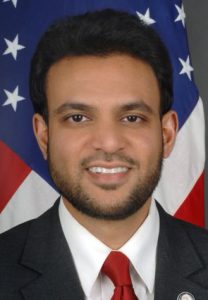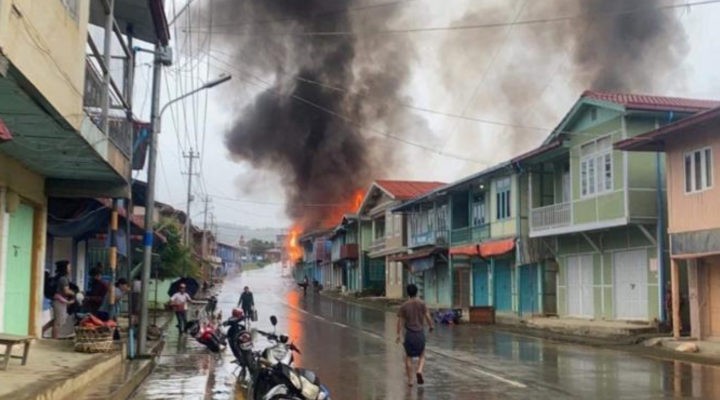Its continuing domestic crackdowns on minority religious groups and its invasion of Ukraine have solidified Russia’s status as one of the world’s leading violators of religious freedom, U.S. officials announced this month.
“Following its designation as a Country of Particular Concern last year, Russia has doubled down on its violations of religious freedom rather than reverse course,” said Rashad Hussain, American ambassador-at-large for international religious freedom. He spoke at a news event for the release of the U.S. State Department’s 2021 Report on International Religious Freedom.
While the report is focused on violations that occurred in 2021, it also cites the Anti-Defamation League’s condemnation of the 2022 invasion of Ukraine and claims by President Vladimir Putin “exaggerating the prevalence of antisemitism in that country.”
“Russia regularly reaches new milestones for excessive prison sentences against individuals exercising their religious freedom.”
“Russia regularly reaches new milestones for excessive prison sentences against individuals exercising their religious freedom. And Russian authorities carry out hundreds of home raids against suspected extremists that frequently include violence,” Hussain said.

Rashad Hussain
The report, which has been submitted to Congress, presents more than 2,000 pages of data on the religious freedom successes or failures of nearly 200 nations and territories.
The benefits of granting all people religious liberties are made clear in the analysis, Secretary of State Antony Blinken said during the presentation.
“We know that when the fundamental right of each person to practice their faith, or to choose not to observe a faith, is respected, people can make their fullest contributions to community successes. Entire societies are better off. On the other hand, when governments deny this right, it ignites tension, it sows division. It often leads to instability and conflict.”
Blinken praised Morocco for renovating Jewish heritage sites, Taiwan for easing the way for workers to attend religious services and Iraq for hosting Pope Francis in March 2021.
But at the same time anti-blasphemy and apostacy laws are on the rise along with discriminatory rhetoric against religious minorities, he added. “All societies, including our own and across Europe, must do more to combat rising forms of hate, including anti-Semitism and anti-Muslim sentiment.”

University students take a moment of silence as they gather to clean the Pillar of Shame sculpture by Danish artist Jens Galschiot, to remember the victims of the Tiananmen crackdown in Beijing, at the University of Hong Kong on June 4, 2021, in Hong Kong, China. (Photo by Anthony Kwan/Getty Images)
China, as it has been since the late 1990s, was cited in the report as a major oppressor of religious freedoms.
While that nation’s constitution grants freedom of belief, it adds that those practices must be considered “normal” but does not define “normal.” It also requires members of the Communist Party and military to be atheists and bans religious education for anyone before age 18.
During 2021, the report said, “officials across the country shut down religious venues, including some that were affiliated with the authorized patriotic religious associations, in some but not all cases citing COVID-19 restrictions. The government intensified its campaign against religious groups it characterized as ‘cults.’”
Religious apps were removed from app stores, and faith-based content was removed from messaging services in China, the report explains. “Authorities censored online posts referencing Jesus or the Bible, and there were continued reports that authorities destroyed public displays of religious symbols throughout the country. The government continued to remove architectural features that identified some churches and mosques as religious sites and removed crosses from private property.”
Tibetan Buddhists, Christians, Muslims and Falun Gong members have reported employment and social discrimination while the People’s Republic of China continued its genocidal oppression of Uyghurs in 2021, according to the report: “On Jan. 19, the then secretary of state determined that since at least March 2017, the PRC has committed genocide and crimes against humanity against Uyghurs, who are predominantly Muslim, and members of other ethnic and religious minority groups in Xinjiang.”
Since its Feb. 1, 2021, coup, Myanmar’s military regime has committed “an alarming escalation of grave human rights abuses.”
Since its Feb. 1, 2021, coup, Myanmar’s military regime has committed “an alarming escalation of grave human rights abuses” aimed at both Christian and Muslim minorities, the State Department reported.
“During the year, there were reports of threats, detentions and violence targeting minority religious and ethnoreligious groups. … According to local and international NGOs, there continued to be almost complete impunity for regime security forces that had committed or continued to commit abuses, including what the NGOs said was genocide and crimes against humanity against Rohingya, most of whom are Muslim.”
Just as predictably, Afghanistan is another of the major violators identified in the report, especially after the Taliban takeover of the country in August 2021.
Bahai’s, Christians, Hindus, Sikhs and other non-Muslim minorities have reported continuing harassment at the hands of Muslims there, the report documents. “According to some sources, converts to Christianity and individuals studying Christianity reported receiving threats, including death threats, from family members opposed to their interest in Christianity. They said fears of violent societal repression had further increased since the Taliban takeover.”
Other nations being monitored closely include Eritrea, Saudi Arabia, Nigeria and Vietnam. And there are more, which is why the U.S. and other countries must remain vigilant in defending religious freedom, Hussain said. “Rising societal intolerance and hatred are fueling violence and conflict around the world. Governments must not sit silent or stand idly by in the face of such oppression,” he said.
Related articles:
Uyghur American elected chairman of U.S. Commission on International Religious Freedom
The solution to a peaceful world is respecting other people’s religious freedom, U.S. leader says
In survey of religious oppression across the globe, Russia, Afghanistan and China take center stage


